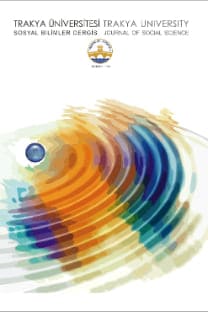Effects of the erasmus programme on Turkish universities and university students
Türk üniversite öğrencilerinin yurtdışında bulunma imkanları, ERASMUS öğrenci değişim programı uygulanana kadar oldukça sınırlı olmuştur. Programın uygulanması bu durumu hızla değiştirmiş ve oldukça önemli sayıda öğrenci Türkiye dışındaki üniversitelerle tanışma, eğitim alma ve başka bir ülkede yaşama imkanına sahip olmuştur. Türkiye Üniversiteleri, başka ülkelerde öğrencilerin aldıkları dersleri kendi programlarında karşılıklarını ve eşitliğini bulmak durumunda kalmıştır. Üniversitelerin uluslararasılaşmasında önemli bir adım olan bu durum Türkiye üniversiteleri ve üniversitelerinde kayıtlı öğrenciler için çok yeni bir durumdur. Bildiri ERASMUS öğrenci değişim Programıyla Almanya’da bulunan Türkiyeli öğrencilerde bu programın etkilerini ele almaktadır. Üç aşamada nitel yöntemlerle Almanya’da toplanan verilerin örneklemini Türkiye’den Almanya’ya ERASMUS Programıyla giden 44 öğrenci oluşturmuştur. Programa katılımla öğrencilerin bakış açılarında, olayları değerlendirmelerinde, eğitim ve mesleki gelecek planlarında ne gibi değişikliklerin olduğu tespit edilmiştir. Bu çerçevede, öğrencilerin bu programa katılmadan önce ve yurtdışında bulundukları sürede hangi kaynaklardan bilgi aldıkları, hangi sorunlarla karşılaştıkları, hangi çözüm yollarına yöneldikleri, ERASMUS Programını, yurtdışında yaşamı ve ERASMUS Programıyla bulundukları üniversiteyi nasıl değerlendirdikleri de bu araştırmayla tespit edilmiştir. Avrupa’da belirli bir süre eğitim gören öğrencilerin, doğal olarak bu ülke üniversitesi ve eğitim sistemi ile kendi üniversitesini ve eğitim sistemini karşılaştırarak değerlendirme yapmaktadırlar. Avrupa’da yaşamı/öğrenci yaşamını Türkiye’deki yaşamla/öğrenci yaşamıyla karşılaştırmalar yapılması nedeniyle öğrencilerin bu programa katılım sonrasında kendi üniversitelerini, eğitim sistemlerini, öğrenci yaşamını nasıl değerlendirdikleri de araştırma içinde yer almaktadır.
Erasmus programının Türkiye üniversiteleri ve üniversite öğrencileri üzerindeki etkileri
Turkish university students’ opportunities for studying abroad were quite restricted prior to the ERASMUS Student Exchange Programme. The implementation of the programme has rapidly changed this situation and significant numbers of students have had the chance to go overseas to live and to learn in universities outside of Turkey. As a result, Turkish universities have felt it necessary to incorporate the equivalent of the classes that students take abroad into their programmes. This situation, an important step in the internationalization of universities, is very new for Turkish universities and the students enrolled in them. This paper looks at the effects of the programme on 44 Turkish students in Germany via the ERASMUS Student Exchange Programme, the sample data being collected by qualitative methods at three stages. The study establishes what kind of changes have occurred in the students’ perspectives, in their assessment of events, and in the long-term outlook of their education and professional future. In this frame, it also establishes their perspectives from before joining the programme and during the time they were abroad, which resources they used to access knowledge, the problems they faced and their solutions, how they assess the ERASMUS Programme as well as living abroad and the university in which they enrolled, as students for a certain time naturally assessed their European study by comparing the university and educational system with that in their home country. The study also investigates to what extent the aims of the ERASMUS Programme have been achieved, which could be summarised as increasing the quality of higher education and strengthening the European dimension in Turkish universities.
___
- Corbett, A. (2005), Universities and the Europe of knowledge: ideas, institutions and policy entrepreneurship in European Community higher education policy, 1955-2005. Palgrave Macmillan, Basingstoke, UK.
- Dunkel, T. & Teichler, U. (2006), Personeller Wissenstransfer im Berufsverlauf zwischen Universität und Wirtschaft - Barrieren und Chancen zur Mobilität / Torsten Dunkel/Ulrich Teichler. Hrsg. vom Deutschen Hochschulverband, Bonn : Dt. Hochschulverb.
- Jahr, V., Schomburg, H. & Teichler, U. (2002), Mobilität von Hochschulabsolventinnen und –absolventen in Europa. İçinde L. Bellman und VELLING, Johannes (Hg.): Arbeitsmärkte für Hochschulqualifizierte. Nürnberg: Institut für Arbeitsmarkt- und Berufsforschung der Bundesanstalt für Arbeit 2002 (Beiträge zur Arbeitsmarkt- und Berufsforschung, Nr. 256), S. 317-345.
- Keeling, R. (2006), “The Bologna Process and the Lisbon Research Agenda: the European Commission's expanding role in higher education discourse”, European Journal of Education, Vol. 41, No. 2.
- Papatsiba, V. (2005), Political and Individual Rationales of Student Mobility: a case-study of ERASMUS and a French regional scheme for studies abroad. European Journal of Education, 40(2), 173–188.
- Stichweh, R. (2000), Von der "Peregrinatio Academica" zur globalen Migration von Studenten. Nationale Kultur und funktionale Differenzierung als Leitthemen. İçinde J. Schriewer, C. Charle & P. Wagner (Hg.), Transnational Intellectual Networks and the Cultural Logics of Nations. (S. 146-169) Frankfurt a.M.: Campus
- Teichler, U. (2007), Die Internationalisierung der Hochschulen : neue Herausforderungen und Strategien. Frankfurt, M.; New York : Campus Tekin, U. (2010), Die Geschichte der “Gastarbeiter” neu schreiben. Migration und Soziale Arbeit 2010, Heft 2, 98-102.
- Verwiebe, R. (2008), Statusveränderungen und innereuropäische Wanderungen. Ergebnisse einer Verknüpfung qualitativer und quantitativer Befunde. In: Berger, Peter A./Weiß, Anja (Hg.) Transnationalisierung sozialer Ungleichheit. Wiesbaden, S. 185- 210.
- Yağcı, E, Ekinci, E., Burgaz, B. ,Kelecioğlu, H. & Ergene, T. (2007), Yurt Dışına Giden Hacettepe Üniversitesi ERASMUS Öğrencilerinin Memnuniyet Düzeyleri. Hacettepe Üniversitesi Eğitim Fakültesi Dergisi (H. U. Journal of Education) 33, 229–239.
- Wit, H. (2002), Internationalization of higher education in the United States of America and Europe: A Historical, Comparative, and Conceptual Analysis, for International Higher Education and the Program in Higher Education, Boston.
- Neave, G. (2003), The Bologna declaration: Some of the historic dilemmas posed by the reconstruction of the community in Europe's systems of higher education, Educational Policy, Vol. 17 No. 1, 141-164.
- ISSN: 1305-7766
- Yayın Aralığı: Yılda 2 Sayı
- Başlangıç: 2000
- Yayıncı: Trakya Üniversitesi Sosyal Bilimler Enstitüsü
Sayıdaki Diğer Makaleler
NEOLİBERALİZMİN TEOLOJİK- SİYASİ TEMELİ VE FİNANS KAPİTAL
TÜRK HAVA SAHASININ BELİRLENMESİ (1914-1923)
DON KİŞOT, BİR ŞÖVALYE ÜZERİNE FANTASTİK ÇEŞİTLEMELER (OP.35)
ETKİLİ ÖĞRETMEN ÖZELLİKLERİ ÜZERİNE SIRALAMA YÖNTEMİYLE BİR ÖLÇEKLEME ÇALIŞMASI
Metin ÖZKAN, H. İsmail ARSLANTAŞ
EĞİTİM PERSPEKTİFİNDEN ELEKTRONİK PERFORMANS DESTEK SİSTEMLERİ
MODERN BÜYÜME TEORİLERİNİN İLHAM KAYNAĞI OLARAK ADAM SMITH'İN EKONOMİK BÜYÜME İLE İLGİLİ FİKİRLERİ
BİR TÖRE OYUNU: BESA YAHUT AHDE VEFA
